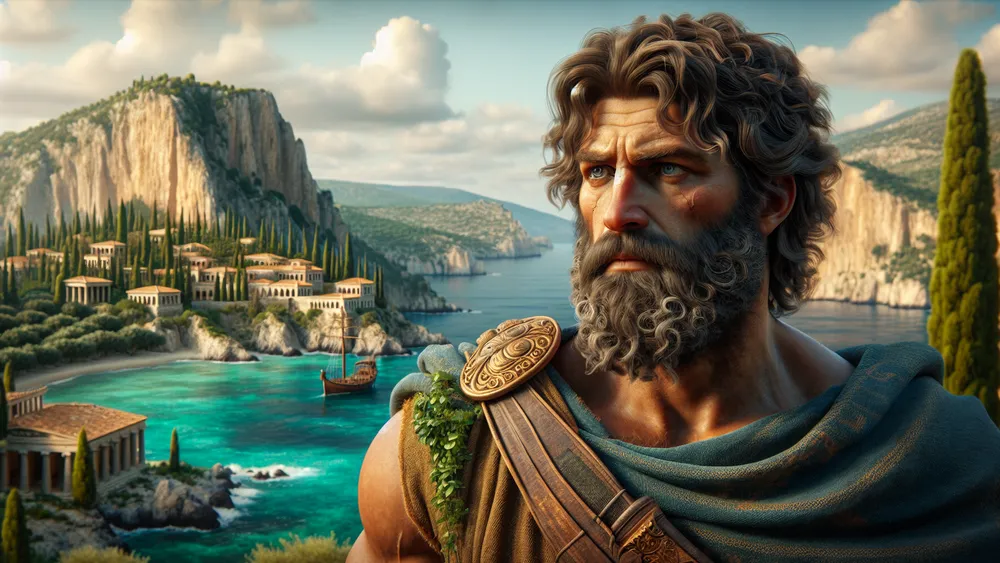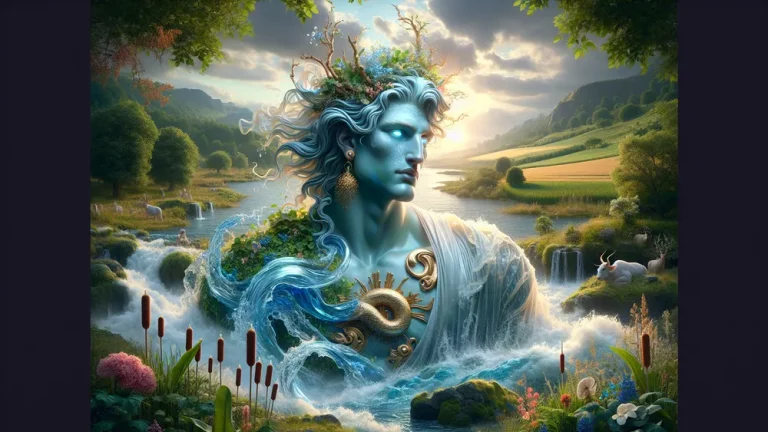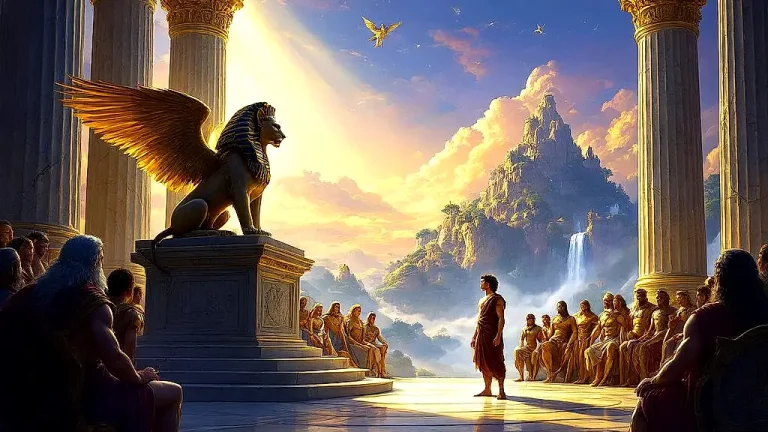The Island Of Ithaca: Mythical Home Of Odysseus In Greek Lore
In Greek mythology, there are places that make people think, dream, and wonder about the past, and Ithaca is one of these places. It is known as the home of Odysseus, the famous hero. In Homer’s Odyssey, a long poem, Ithaca takes on ideas like not giving up, identity, and wanting to return home. Odysseus had a very long trip back to Ithaca after the Trojan War. It took him ten years.
Key Points:
- Ithaca is known as Odysseus’ home in Greek mythology and symbolizes belonging, persistence, and return.
- Homer’s descriptions of Ithaca focus on its rocky land, olive trees, harbors, and being farthest out to sea, to the west.
- Modern Itháki is often linked to Ithaca, but theories debate other locations like Paliki Peninsula, Lefkada, or Corfu.
- Odysseus’ journey back to Ithaca highlights loyalty, strength, and identity, with help and obstacles from gods like Athena and Poseidon.
- His Trojan War role included creating the Trojan Horse, uniting leaders, and rescuing Helen.
- Odysseus regained Ithaca through a final battle with suitors, restoring his kingdom with help from his son and loyal friends.
- Ithaca’s location remains uncertain, blending history, myth, and inspiration.
People have found this journey interesting for a really long time. His story talks about what he went through and also about loyalty and how much he wanted to go back. Homer’s Ithaca has often sounded like it is a real island.
But as time went on, people started to ask if it could actually be the same place as the modern island of Itháki, or maybe the Paliki peninsula on Kefalonia, or even somewhere else entirely. Scholars and researchers still try to figure this out.
Ancient myths, though, do not always match real places – they often mix together stories, maps, and ideas to make something for people to think about. This is why it is still unclear what matches what from the myths. Here, Ithaca will be looked at step by step: its location, its myths, and its place in Odysseus’ life.
Whether this is your first time learning about these ideas or you already know them, the story of Ithaca speaks to something important – the desire to find a home.
The Island Of Ithaca: Overview and Key Facts
| Key Aspect | Details |
|---|---|
| Mythological Origin | Ithaca is best known because of Homer’s Odyssey, where it is the home of Odysseus, the clever Greek hero who is remembered for his great thinking and strength. |
| Location in Myth | A rocky island in the Ionian Sea, Ithaca appears with its own harbors, areas full of olive trees, and mountains. These things make it stand for beauty and also loneliness. |
| Symbolism | What Ithaca means includes ideas like loyalty and wanting home, but also sticking to things and knowing who you are. It explains coming back home and growing over time, just like in Odysseus‘ life. |
| Role in the Odyssey | The island is where Odysseus ends his ten-year-long trip and where he helps his family by defeating the suitors who took over his home and kingdom. |
| Historical Debate | Even though people today think modern Itháki is the same place as Homer’s Ithaca, others say it might be somewhere like the Paliki peninsula in Kefalonia or maybe somewhere else, like Lefkada. |
| Cultural Importance | Ithaca has an important place in Greek mythology and is known as part of cultural history, one that has been used in stories, artwork, and ideas for hundreds of years. |
| Divine Influence | The gods play a big part in its history. Poseidon blocked Odysseus’ trip to Ithaca for revenge – because of the giant Polyphemus – but Athena helped him return. |
| Physical Characteristics | Homer wrote that Ithaca is low and rugged, with fertile valleys, natural harbors, and hills. Even though it is small, it would have stood out in its specific location in the Ionian Sea, where people knew it. |
Why Ithaca Was So Important in Myths
Ithaca has an essential place in Greek mythology, working as both a real location and a symbol of meaning tied to Odysseus‘ long and complicated trip. If you want to figure out why this small island mattered so much in old stories, it makes sense to think about different things.
For one, where people said Ithaca was; for another, what it stood for in personal and bigger ways; and then, what the gods did that changed its story forever.
How Ancient Myths Described Ithaca’s Location and Features
In Homer’s famous story called the Odyssey, Ithaca is described with features of its land that are vivid but hard to match up with real places.
Homer writes that it is “low-lying,” although some people translate this to mean “rocky.” It is said to have many natural harbors and coves. The land had olive trees and fertile farms. Rugged and simple, but full of importance. One line even says it is “farthest out to sea, to the west.” But this has caused problems for historians.
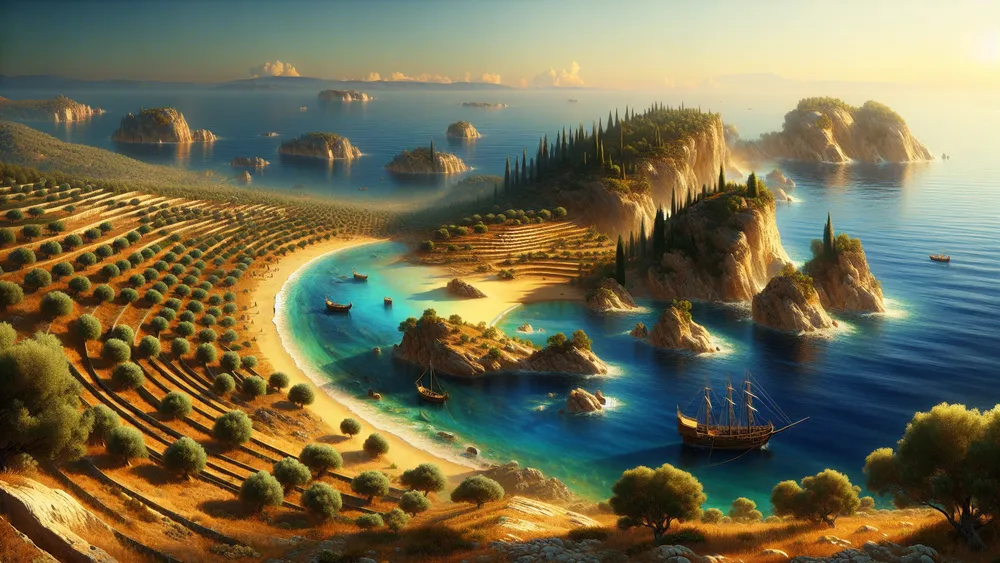
People today think that modern Itháki, the island connected to Homer’s Ithaca, does not perfectly fit this description when compared to nearby islands in the Ionian Sea. This has caused historians and scholars to spend hundreds of years debating whether Homer’s Ithaca is real or something more symbolic, created to stand for an ideal home instead of an actual island.
Archaeologists today try to connect how Homer described Ithaca with real geography. Many still believe modern Itháki is the Ithaca of the Odyssey. But some think Paliki, a peninsula on Kefalonia, might have been an independent island in the past, which could fit Homer’s description of being “farthest to the west.” Another idea is that Lefkada is the real island. It has features and is located in a way that some think matches, but it does not quite fit Homer’s description of being isolated. Below is a table comparing what Homer describes with ideas from today:
| Aspect | Homer’s Description | Modern Ideas |
|---|---|---|
| Location | “Farthest out to sea, to the west” | Paliki fits this; modern Itháki is closer to the east. |
| Features of the Land | Rugged, “low-lying,” rocky, fertile, with harbors | Paliki is rugged and isolated; Itháki matches some parts, but “low-lying” is unsure. |
| Nearby Islands | Part of a cluster but still distinct | Itháki is close to others, but Paliki might have been separate long ago. |
| Olive Trees and Farms | Land with olives and good for farming | Itháki and Paliki both fit this; Lefkada has less farming historically. |
The gap between Homer’s descriptions and geography has kept people guessing for centuries. For now, no single answer explains everything.
The true location of Homer’s Ithaca remains uncertain because its description conflicts with modern geography, leaving scholars to debate whether it represents a real place or an idealized idea of home.
Ithaca: The Home Odysseus Always Longed For
For Odysseus, Ithaca was much more than just a place. It stood for everything he worked so hard to achieve during his long and difficult journey after the Trojan War. In the Odyssey, Homer tells the story of how Odysseus struggled through trial after trial. He fought the Cyclops Polyphemus, dealt with the temptations of both Circe and Calypso, and endured countless other challenges.
But no matter what, his goal stayed steady. He wanted to return to Ithaca, where his family lived, his kingdom waited, and where he truly felt he belonged. Homer describes Ithaca as a simple and rugged land, not a rich or powerful place. Its simplicity means a lot – it’s not about riches or strength but about the personal connection Odysseus has with it.
His longing for Ithaca is something many people understand: the deep need to get back to the one place where you feel at home, even when the path there is so hard it feels impossible. But Ithaca doesn’t just mean the final stop in Odysseus’ journey. It explains much more in Greek mythology. For one, it is tied to the idea of perseverance.
Odysseus had to keep going, dealing with dangers to his life, emotional struggles, and the years passing. All these things tested his strength. Beyond that, Ithaca shows how a home can be more than a physical spot – it’s a part of who you are. Odysseus was determined to reclaim his role as Penelope’s husband, Telemachus’ father, and as king of the land that depended on him.
The island represents all this. It is proof that struggles and achievements are tied to identity and a person’s sense of origin. This idea has lasted over time and inspired art and writing, like Constantine P. Cavafy’s poem “Ithaka,” which talks about Ithaca as a goal that gives life meaning.
Through the story of Odysseus, Homer shows how much hope, strength, and belonging can push someone forward, no matter how many challenges stand in the way.
How the Gods Played Their Part in Ithaca’s Stories
The gods had a big impact on Odysseus’ journey and his return to Ithaca, turning the small, rugged island into the center of a significant story about justice, right and wrong, and being a hero. Athena, the goddess of wisdom, helped Odysseus again and again, giving him support and standing with him when he needed it most.
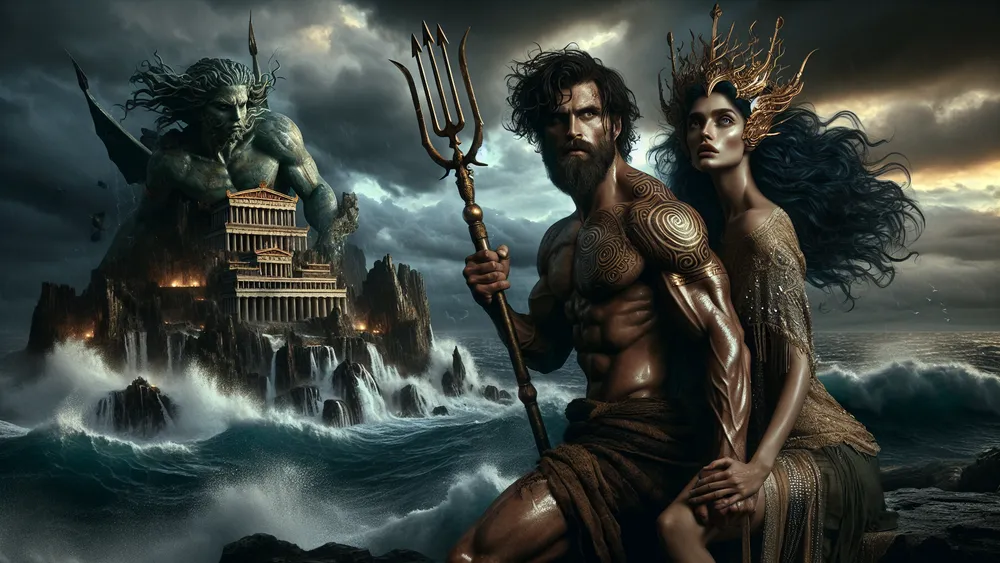
She helped him by disguising him as a beggar when he went back to Ithaca. Later, she helped him win back his home by defeating the suitors who were trying to take Penelope away from him. The way she stayed by his side clearly made it known that Odysseus had a right to his home and his family.
On the other hand, Poseidon, the god of the sea, worked against Odysseus. He was angry because Odysseus had blinded his son, the Cyclops Polyphemus, and wanted revenge. The god punished Odysseus through storms, shipwrecks, and long, difficult delays. It was clear that he wanted Odysseus to pay for what he had done.
Together, the actions of Athena and Poseidon made Ithaca’s story about fairness and the struggle of humans to get through challenges. The way the gods acted – one helping and the other seeking revenge – reflected how people themselves often feel, whether angry or compassionate, but on a much bigger scale.
Stories That Brought Ithaca to Life
The stories about Ithaca cannot be separated from the events in the life of its best-known leader, Odysseus. These stories explain why the island mattered so much in myths. From the Trojan War to when the hero finally came back home, each tale helped to define Ithaca’s place in history. Here are those famous tales, starting from war and ending with his long-awaited return.
Odysseus’ Role in the Trojan War
Odysseus was not just a strong leader and capable fighter. He was also one of the smartest people in the Greek army during the Trojan War. People see him as the one behind some of the best war strategies, and he played an essential part in the ten-year fight for Troy.
His most famous idea was creating the Trojan Horse, a giant wooden structure that secretly helped the Greeks get into the well-guarded city of Troy. For ten years, nothing worked. Then Odysseus came up with the idea of building the huge horse and pretending it was a gift. The Trojans thought this horse was a symbol of the Greeks giving up and leaving, so they took it into their city as a prize.
Inside the horse, however, were Greek soldiers hiding. During the night, these men came out, opened the gates, and let the rest of the Greek army in to attack. This plan wasn’t just smart – it was proof of how Odysseus often used his mind instead of only physical power. Beyond the Trojan Horse, Odysseus had a role in many other critical moments of the war.
He helped convince Achilles, who didn’t want to go, to join the war. This brought one of Greece’s most important fighters into the battle. He also settled arguments between leaders like Agamemnon and Achilles, keeping everyone working together. Whether it was stealing the Palladium – a sacred statue thought to protect Troy – or helping with ambush plans, Odysseus always stayed smart, resourceful, and focused.
Here are some of the key moments that prove how important Odysseus was:
- The Trojan Horse: He suggested building it, which led to the defeat of Troy.
- Recruiting Achilles: He convinced Achilles to fight, which strengthened the Greek army.
- The Rescue of Helen: He helped bring Helen back after Troy fell.
- Stealing the Palladium: He helped steal this sacred statue that was thought to protect Troy.
- Mediator Between Leaders: He resolved disputes between leaders like Agamemnon and Achilles to keep the team united.
Odysseus’ role in the Trojan War explains why he is still remembered as one of the greatest leaders and thinkers in all of Greek mythology.
The Chronicles of Odysseus’ Long Way Home
In Homer’s Odyssey, Odysseus faces many challenges during his long, difficult ten-year trip back from Troy. One of the most famous parts of his journey happens in the cave of Polyphemus, a Cyclops who traps Odysseus and his men. To escape, Odysseus makes a plan to blind Polyphemus by attacking his eye.
He tells the monster his name is “Nobody,” tricking Polyphemus so that, when he calls for help, he confuses everyone around him. But this act makes Poseidon, the Cyclops’ father, very angry. Poseidon makes the trip longer by sending storms and making travel harder. Later, Odysseus reaches the island of Circe, a sorceress with a lot of power. At first, she turns his men into pigs.
With help from Hermes and by being very brave, Odysseus saves his men. He stays there for a year, making an agreement with Circe that is not completely friendly. He only leaves because it is time to continue his journey. There is also the incident with the Sirens, creatures whose songs made sailors so distracted they lost control of their ships.
Odysseus ties himself to the ship while forcing his crew to block their ears with wax so no one is hurt. Meanwhile, back at home in Ithaca, Penelope, his wife, shows the same kind of strength and cleverness as Odysseus. Many suitors want to marry her, thinking he is dead. But Penelope is very loyal.
She promises to pick a husband after finishing weaving a burial cloth for Laertes, Odysseus’ father, but secretly she undoes the weaving every night to avoid choosing anyone. Other trials also slow Odysseus down, like the time he was stuck for seven years on the island of Calypso, a nymph who offered to make him live forever. He refused because all he wanted was to go home.
In the end, help from the gods lets him leave. Through all of these experiences, it is clear that no matter how hard the trip became, Odysseus and Penelope never stopped trying to reunite.
The Clash with the Suitors and Ithaca Restored
The final fight in Homer’s Odyssey happens when Odysseus, pretending to be a beggar, finally makes it clear who he is. He gets revenge on over a hundred suitors who had been causing trouble in his home for years. These men thought Odysseus was dead, tried to marry Penelope, and wasted all of his family’s money by eating his food and throwing parties.
With the help of his son, Telemachus, and a few loyal friends, like Eumaeus the swineherd, Odysseus creates a plan to destroy them during a challenge that Penelope suggests. The challenge is this: the suitors must string Odysseus’ large bow and shoot an arrow through twelve axe heads. Only the true king can do this. One by one, the suitors try, but none of them can succeed.
Then, the “beggar” takes the bow, strings it with no trouble, and shoots through the axe heads so perfectly it surprises everyone. At that moment, Odysseus reveals who he really is. There is noise, confusion, and fear as Odysseus and Telemachus take the weapons they had hidden earlier. Together, they kill the suitors while locking the hall so none of them can escape.
This fight is not just about getting revenge. Odysseus punishes the suitors for their arrogance and for breaking xenia, the cultural rules about how guests and hosts should treat one another. Once these men are gone, Odysseus takes back his place as king. His family and Ithaca can finally have peace again, and order is restored to the kingdom.
Odysseus, with his son and allies, defeats the suitors who disrespected his family and home, reclaiming his role as king and bringing peace to Ithaca.
The Overlooked Story of Laertes, Ithaca’s Wise Elder
Laertes, the father of Odysseus and a former king of Ithaca, plays a smaller role in Homer’s Odyssey compared to the larger events happening around him. By the time Odysseus starts his journey, Laertes has stepped away from being king. He lives by himself on a small farm, far from the palace.
He took himself away from society because he is old and because he feels deep sadness. His son has been gone for so long, and he believes that his wife, Anticlea, has died. Even though he is isolated, Laertes still represents how Ithaca’s honor and traditions have lasted over time.
He no longer has power as a king, but his farming and care for the land prove how much he still cares for Ithaca. Later, when Odysseus finally meets his father again, it becomes one of the most touching moments in the story. Odysseus makes his father believe it by talking about their past and by describing the orchard that Laertes gave him as a boy.
Only after hearing these things does the old man recognize him as his son. This meeting is about more than just a family reunion. It makes clear the bond between them and shows that Laertes is still important as a part of his son’s story. The life of Laertes is not just about being a father who is sad.
He serves as a symbol of connection. As Odysseus’ father and the grandfather of Telemachus, he connects the past, present, and future of Ithaca’s royal family. In ancient Greek culture, family and inheritance were tied to identity and stability, and Laertes reinforces this idea. Near the end of the Odyssey, Laertes joins Odysseus and Telemachus to help defend their home.
Together, they drive away the families of the suitors who want revenge. In that fight, Laertes gets back some of his strength and courage. Even though he is old, he protects Ithaca one more time. Through this, his part in the story becomes not just about the past but also about preparing for Telemachus’ future. This makes him a key figure in keeping Ithaca’s legacy strong.
Ithaca in Myths Versus Real Life
Even though Ithaca is a critical place in Greek mythology, figuring out where it could be in real life has been a difficult question. People have tried to connect the way it is described in myths to real-world geography, but they still argue about what matches and what does not.
Now is the time to look at how legends from the past agree – or completely disagree – with the current ideas about Ithaca’s location and what it really was.
Homer’s Take on Ithaca’s Natural Beauty
In Homer’s Odyssey, Ithaca is described as a place with tough beauty. It is not known for big riches or being fancy, but for being simple and familiar. The poet clearly explains it as a rocky place that its people love. It has harbors, olive trees, and wild parts of nature that are left untouched. Odysseus talks about how much the place means to him.
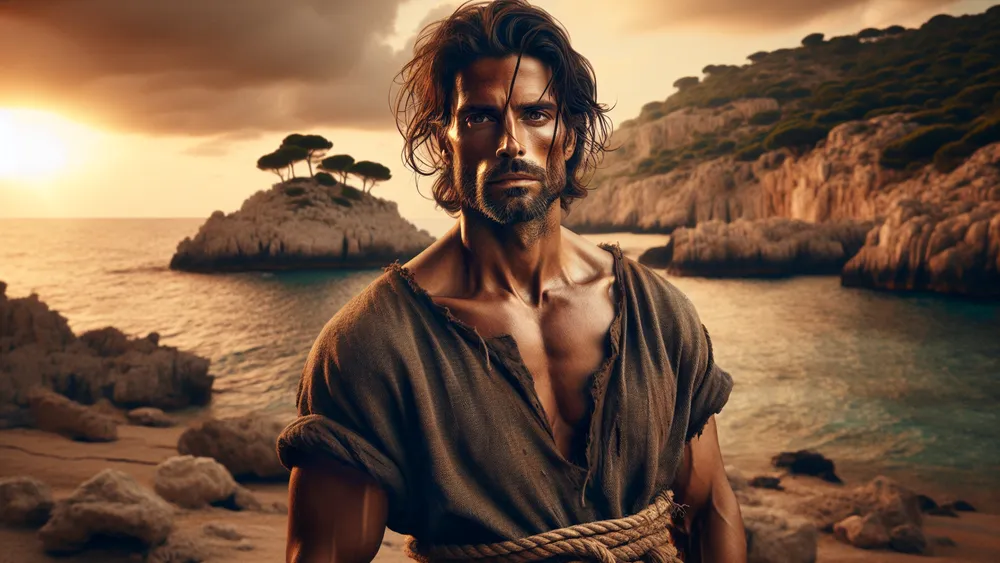
He called it “rough” but still beautiful. This description makes Ithaca sound very real compared to the more polished and impressive places, like Troy or the big, rich homes of the Phaeacians. The olive trees, which are mentioned in the story many times, stand for both food and lasting calm.
The island’s harbors give travelers a safe place to land, almost as if it also gives safety to the spirit of Odysseus, who feels at peace there. The rough land might seem unwelcoming to some people, but Homer explained it in a way that reminds people of how wild, natural places can look beautiful. It’s like how people today might prefer untamed places instead of overly fancy ones.
Ithaca’s description focuses on being steady and trustworthy, not flashy or rich. It really means how home is not a place defined by big, expensive things but by personal meaning and the feeling of belonging.
The Ongoing Argument About Ithaca’s True Location
For hundreds of years, people have argued about whether Homer’s Ithaca was a real place or just something he made up. Some modern archaeological ideas indicate that it could match certain spots in the Ionian Sea, and these ideas give people new ways to think about it. They try to connect Homer’s description of Ithaca as a western island, with noticeable harbors and hilly landscapes, to actual places. But this is not easy. This is because parts of Homer’s story are unclear, and he might have added extra details to make the story sound better. The landscape itself could also have changed in the last few thousand years. These things make it harder to figure out Ithaca’s real location. Below are some of the main ideas people have come up with:
- Paliki Peninsula (Part of Kefalonia): The idea from geologist Robert Bittlestone is that the Paliki Peninsula on Kefalonia could be Ithaca. He said land sinking over time might have turned what used to be an island into part of a peninsula, fitting Homer’s description of Ithaca being toward the west. But some critics wonder if there is enough geological proof to back up this claim.
- Modern Ithaki (Traditional Identification): The island of Ithaki, named after Ithaca, has for a long time been seen as Homer’s Ithaca. Its name and history make this idea popular. It has features that match parts of the Odyssey, like how close it is to nearby islands. Still, some experts think it doesn’t fully match how Homer described it, especially where it is compared to other places.
- Lefkada (Lefkas): Some believe Homer’s Ithaca is really Lefkada, which is a larger island. They think it fits the idea of Ithaca being westward. But not all of Homer’s details about Ithaca’s geography work for this idea.
- Corfu (Kerkyra): Another idea is that Corfu might be Ithaca. It has a rough and green landscape, though it is not a favorite theory. This is because Corfu’s location compared to other places and its history in Homer’s time don’t match well.
These different ideas show how Ithaca’s location is still a mystery. It mixes real history, myths, and imagination, creating an endless debate about the truth of Homer’s epic world.
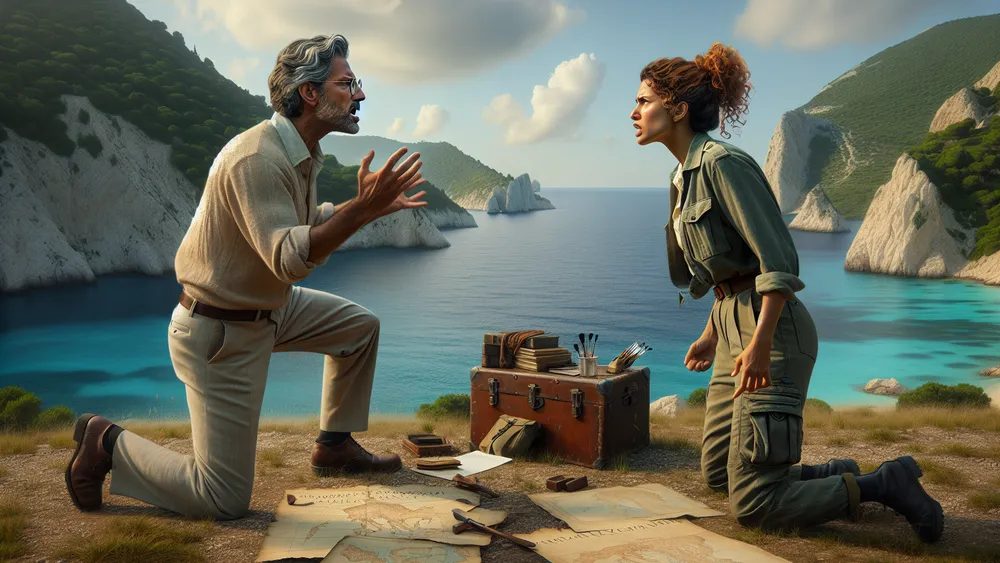
Nature’s Wonders in Greek Mythology
In Greek mythology, natural features were not just simple backgrounds. They were treated as living things with deep meaning related to gods, often tied to myths and stories. People believed that mountains like Mount Olympus were the home of the gods, while rivers such as the Acheron were seen as gateways to the Underworld.
Forest and cave landscapes, even ones that seemed ordinary, became places where gods were met or where heroes proved themselves. To the Greeks, nature was a space connecting gods and humans. Some locations were thought of as holy, and they were tied to specific gods or goddesses.
This strong link between nature and myths gives us many fascinating stories and ideas about how physical places combine with deeper meaning. For further details about these places, take a look at this list of all the greek Geographical Concepts.
FAQs
1. Was Ithaca a real island in ancient Greece?
Whether Ithaca was a real island in ancient Greece depends on interpretation, as Homer’s Ithaca may align with real locations like modern Ithaki or other debated sites.
2. Did Odysseus rule Ithaca alone?
Odysseus ruled Ithaca alongside his wife, Penelope, who managed the kingdom in his absence.
3. How did Poseidon create troubles for Ithaca?
Poseidon created troubles for Ithaca by relentlessly hindering Odysseus’ return, prolonging his absence and leaving Ithaca vulnerable to chaos and disorder.
4. Which Iliad myths link back to Ithaca?
Iliad myths link back to Ithaca primarily through the character of Odysseus, who is depicted as a cunning strategist and leader from Ithaca instrumental in the Greek victory at Troy.

